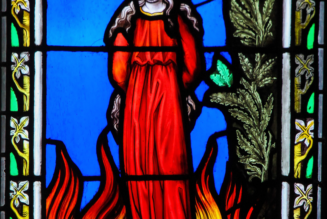By Dr. Jeff Mirus ( bio – articles – email ) | Jan 12, 2024
Somewhere along the way I developed a relationship with my own personal guardian angel which goes beyond rattling off the “Angel of God” prayer. I think I first noticed this in my mid-30s, which is about the time I finally realized that I could not simply bull my way through life on my own strength. Some of us are a little slow.
Anyway, at a certain point I became convinced that my angel’s name is “Joshua”. I can’t prove it, but I am absolutely certain that he does not object to me calling him by that name. (He’s allowed to call me “Jeff”, too, though the tone in which he says it…varies.) I don’t think I’ve ever had an unmistakable mental conversation with Joshua, and yet there is an almost instantaneous give-and-take there which I consider more than merely imaginative—a sign of God’s love conveyed by a personal emissary. Everyone’s experience along these lines will vary, for I believe what we are talking about here can be a kind of friendship.
Some expositors on this question make a big deal out of the fact that the Church has not dogmatically defined the existence of angels, as if that makes belief in them purely optional. But the Church typically defines things only when there is a big argument about them among Catholics—such as an argument between Catholics who accept the existence of angels and Catholics who believe angelic references in Scripture to be mere personifications of the action of God. But among those who accept all the dogmas of the Catholic Church, angel-deniers must be remarkably few and far between…if they exist at all. In fact, I am willing to bet that those who do not accept the existence of guardian angels (or, really, of any angels) also refuse to accept many formally defined teachings of the Magisterium.
The more we doubt or reject Catholic beliefs, the easier it is to deny the validity of the moral demands of the Church. Still, to get rid of angels, we have to insist that everything Scripture and Tradition say about Satan and the other fallen angels—or about St. Michael and the host of angels that worship the Lamb and do God’s will—is purely symbolic. I am willing to go even farther here and wager that the overwhelming majority of “Christians” who reject the existence of angelic beings also reject the bodily Resurrection of Jesus Christ, without which Christianity makes exactly zero sense. So don’t be one of them. And while you are believing, make sure you actively welcome your angel’s accompaniment throughout life. He’s been assigned by your heavenly Father to bring you safely home.
Some background
If you believe Scripture is Divinely revealed—and you also actually read it—you’ll find good angels everywhere, in both the Old Testament and the New, beginning with the book of Genesis when, after the Fall of Adam and Eve, God placed a cherubim with a flaming sword to block entrance to the Garden of Eden (3:24). But of course even that is the second reference to an angelic being, the first being the “serpent”—that is, the Devil, who tempted Eve. And you will find demons mentioned throughout the Old and New Testaments as well. Already present in the first book of the Old Testament, angels and their relationship with God are far more thoroughly described in the last book of the New Testament.
Such references could be taken as merely symbolic if they were both few and far between and rather shadowy, but they recur again and again in Scripture, and several of the angels actually give their names. Moreover, Christ Himself refers with some frequency not only to “the devil and his angels” (e.g., Mt 25:41) but to the angels who do God’s will in Heaven. In fact, Our Lord testified specifically to the existence of personal guardian angels when He warned: “See that you do not despise one of these little ones; for I tell you that in heaven their angels always behold the face of my Father who is in heaven” (Mt 18:10). If you want a more comprehensive look at the awesome, heroic and even spine-tingling role of angels in the Divine dispensation, reread the Book of Revelation.
In any case, the Catholic Church has always taken the existence of angels for granted, as most recently stated in the Catechism: “The existence of the spiritual, non-corporeal beings that Sacred Scripture usually calls ‘angels’ is a truth of faith. The witness of Scripture is as clear as the unanimity of Tradition” (#328). So don’t be fooled by those who insist that we cannot be certain because the existence of angels is not a “dogma”. A spiritual life based on dogma alone would be remarkably thin. For further reference, a good overview of what we really do know about angels can be found in the original (early twentieth-century) Catholic Encyclopedia entry on Angel.
All the help we can get
One of the interesting things about the fallen angels is that they manifest themselves more openly when Christianity and the presence of the Church in any given society are non-existent or weakening. Where faith is strong, in most cases the demons tempt us invisibly through their “suggestions”, but if there is no Christian presence in a society—or as that presence weakens, diminishes, and disappears—they tend to manifest themselves more openly, not only by tempting people to become cultic followers of Satan but through various forms of diabolical obsession and possession.
It is no surprise, therefore, that a century or more ago, we heard of most cases of demonic obsession, infestation, possession and Satanic cults as occurring in the territories of the young, minority churches in Africa, with very few of these manifestations in, say, Europe or America. As the Church has strengthened in Africa and weakened in the West, however, the situation has been gradually reversing—with overt demonic activity increasing wherever a dramatically-decreasing number of persons are baptized. More and more instances of Satanic activity and Satanic worship are being documented in the United States, for example, with every passing decade. Satan is always emboldened by the weakness of the Church and the absence of Christ’s presence in souls. Where Faith is strong, he dare not manifest Himself openly; as it weakens, he seeks a more direct and open domination.
Most of us are living now in regions where the greatest evils are being promoted as goods, where Christian religious belief and practice are steadily diminishing, and where—with even the Catholic Church largely on the run spiritually, culturally, socially and politically—Satan is manifesting himself more and more openly. This can be seen not only through the ever-increasing confusion between good and evil (a confusion so great and seemingly obvious as to be hard for a Christian even to believe possible), but also through the growth and even social acceptance of openly Satanic cults. We might also point to the Satanic denials and subversions of our human nature which are increasingly being protected and encouraged through ever-changing laws.
More years ago than I care to count, one influential Catholic acquaintance of mine, who was 22 years my senior, let slip that he thought his guardian angel answered to the name of “Skippy”. I confess this rocked my confidence in ascribing names to our guardian angels (I mean, really, “Skippy”?), but whether or not we can know their names, our confidence in their existence is justified both by the Church and by Christ Himself—at whose empty tomb the angels bore witness when He had broken the very bonds of death.
So don’t be shy. Talk with your guardian angel. Get to know him. Seek his help.
Sound Off! CatholicCulture.org supporters weigh in.
All comments are moderated. To lighten our editing burden, only current donors are allowed to Sound Off. If you are a current donor, log in to see the comment form; otherwise please support our work, and Sound Off!

There are no comments yet for this item.









